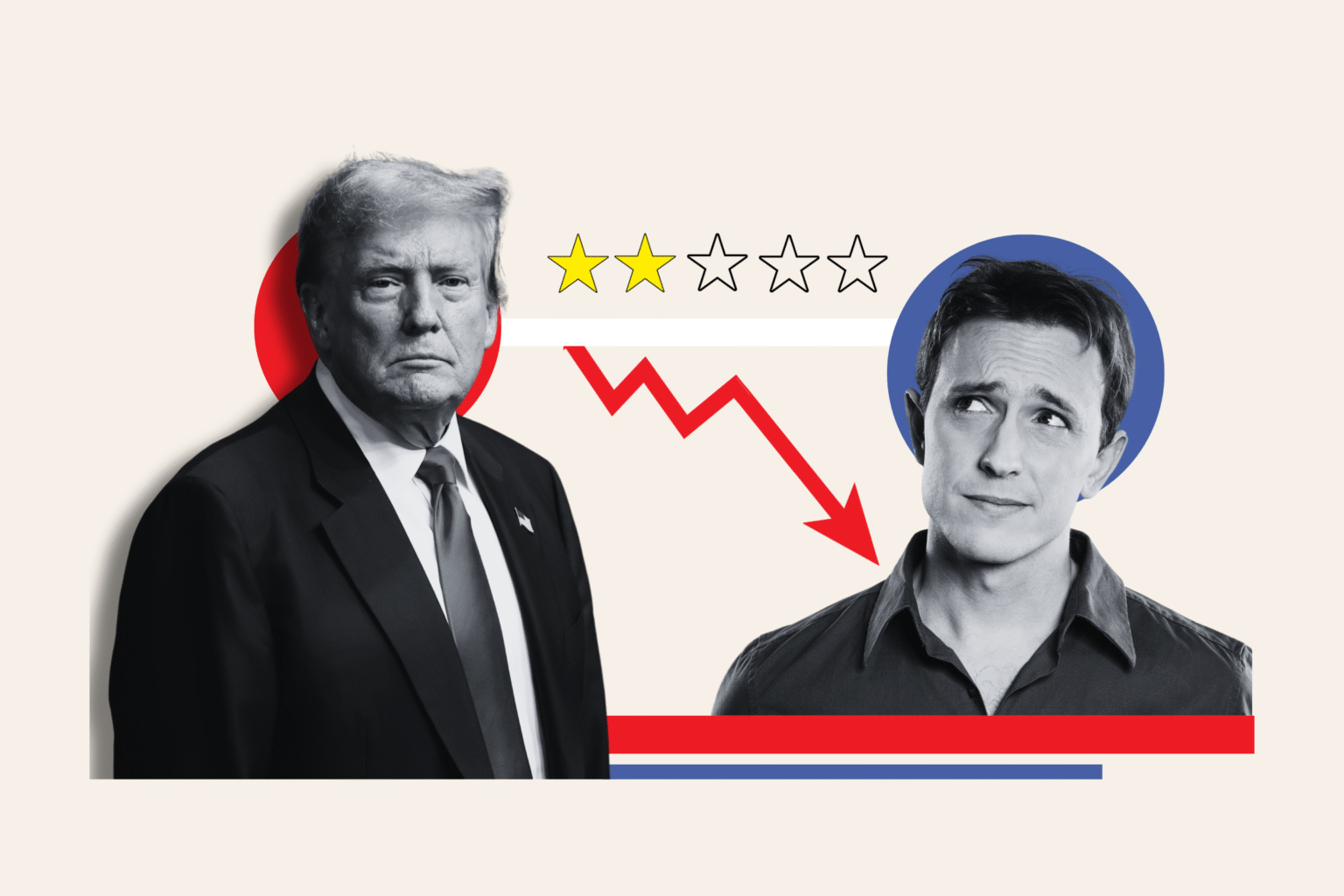Donald Trump’s approval rating with men is turning sour, according to multiple polls.
Men have traditionally been one of the strongest bases of support for Republicans. And indeed, in 2024, 55 percent of male voters supported Trump. President Trump also made significant inroads with young men in 2024, who historically have leaned more towards the Democrats. In 2024, 53 percent of men aged 18-44 broke for Trump, up from 45 percent in 2020, when Joe Biden won the young male vote with 52 percent of the vote.
Gender scholars like Jackson Katz have put Trump’s win in 2024 among men down to his image as a “tough,” anti-political correctness figure
“Many voters base their decisions less on ideology or policy than on perceptions and narrative. This is certainly the case with many of the young men who voted for Trump in 2024. They were some of the least engaged and lowest information voters. Their support was based not on ideology or policy as much as on a vibe, or a sense, that Trump was the ‘men’s’ candidate. He was physically ‘tough’ as evidenced by his response to the Butler, PA assassination attempt, he’s not ‘politically correct’ and speaks his mind, he’s a businessman who supposedly knows how to manage the economy, and so forth. This is all part of the Trumpian narrative,” he previously told Newsweek.
But polls now show that Trump’s image as the ‘men’s’ candidate may be beginning to unravel.
Trump’s Approval Rating Slumps With Men
According to a Pew Research poll, conducted between April 7-13 among 3,589 Americans, Trump’s approval among men has dropped from a net positive in February (52 percent approve, 46 percent disapprove) to a net negative in April (44 percent approve, 55 percent disapprove). That represents a 17-point swing in a matter of months. The latest poll had a margin of error of +/- 1.8 percentage points.
Similarly, the latest Economist/YouGov poll, conducted between April 19-22 among 1,625 respondents, shows Trump at 45 percent approval and 49 percent disapproval among male respondents—down from 55/40 just a month earlier. That represents a 19-point net drop in just four weeks. Both polls had a margin of error of +/- 3.3 percentage points.
Meanwhile, a Fox News poll, conducted between April 18-21 among 1,104 registered voters, found male support at 48/51, down from a breakeven 50/50 split in March. Both polls had a margin of error of +/- 3 percentage points.
Trump’s approval rating is also deep underwater among young men. The latest Harvard Youth Poll, conducted between March 14 and 25 among 2,096 18-to-29-year-olds, found that Trump’s approval rating among Gen Z men currently stands at 34 percent, while 59 percent disapprove. And analysis by YouGov showed that Trump’s net approval rating among 18-29 year olds has declined by 29 points since he began his second term, from +5 points in January, to -24 points now.
“Turns out a fist bump’s different than really being a tough guy,” Joan C. Williams. author of the forthcoming book, Outclassed: How the Left Lost the Working Class and How to Win Them Back, told Newsweek. “Trump enacted a superhero script when he jumped up and punched the sky after the 2024 assassination attempt: the tough guy,” But, Williams said, men may now be realizing the “tough guy” image doesn’t match the outcomes.
Tariffs Hurt Trump in the Polls
It comes after Trump unveiled a new round of tariffs earlier this month. The announcement sent financial markets into turmoil: Wall Street suffered its worst single-day loss since the pandemic era, and global markets followed suit.
But although the stock market has partially recovered, fears about the state of the economy still persist—and they are eating away at his support, according to Williams.
“He promised to create blue-collar jobs so men could be providers again, a role particularly cherished by Latinos and men without college degrees. But here’s the fact: Trump’s tariffs threaten blue-collar auto jobs because supply chains are so integrated that products pass back and forth many times between the US, Mexico and Canada, incurring expensive tariffs at each step. Some car companies announced layoffs,” Williams said.
She added: “Many Latinos, Asian Americans, and non-college grads aspire to be small businessmen, so another part of Trump’s appeal is as a business tycoon. Trump presents himself as pro-business by eliding the difference between Big Business and small businesses. That’s easy in a campaign, but harder in the face of tariffs that will raise costs for millions of small businesses that sell toys, greeting cards, or party favors sourced internationally—while Big Businesses like Apple are handed sweetheart deals that evade the tariffs.
“Trump’s support in rural areas has fallen from nearly two-thirds to slightly more than half of men, no doubt because tariffs threaten farmers dependent on foreign markets, from almond growers to soybean farmers whose Chinese customers are now looking to Brazil. Meanwhile, the price of eggs is higher than ever and Trump’s macho-man image is wearing thin.”
Casey Burgat, Director of the Legislative Affairs program at George Washington University’s Graduate School of Political Management, agreed, telling Newsweek: “Economic pressures are always front and center. Rising prices, ongoing trade tensions, and uncertainty around Trump’s proposed tariffs are hitting home.”
“It creates unease, even among typically loyal voters,” he said.
But he noted that “it’s too early to call it a full erosion,” but it is “definitely a warning sign” for Trump, Burgat said.
Read the full article here

